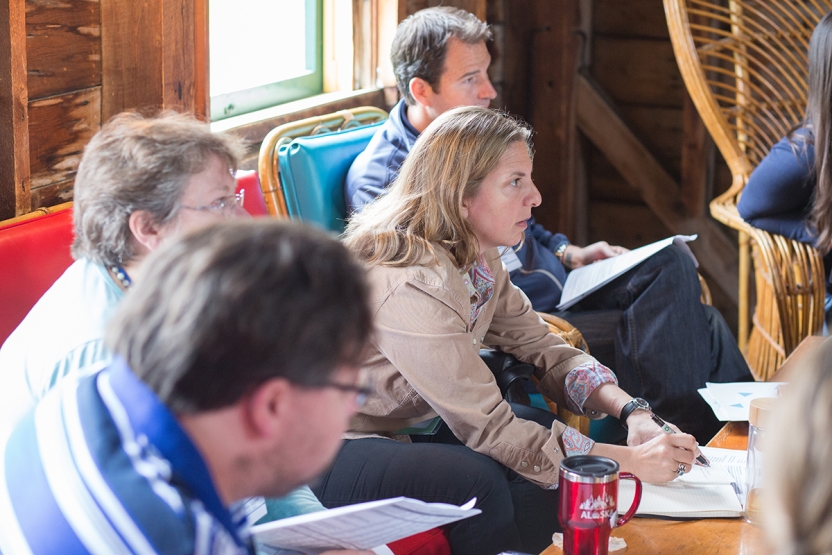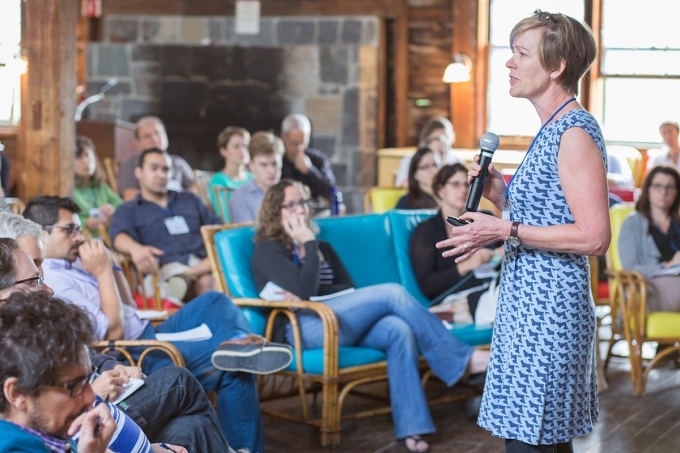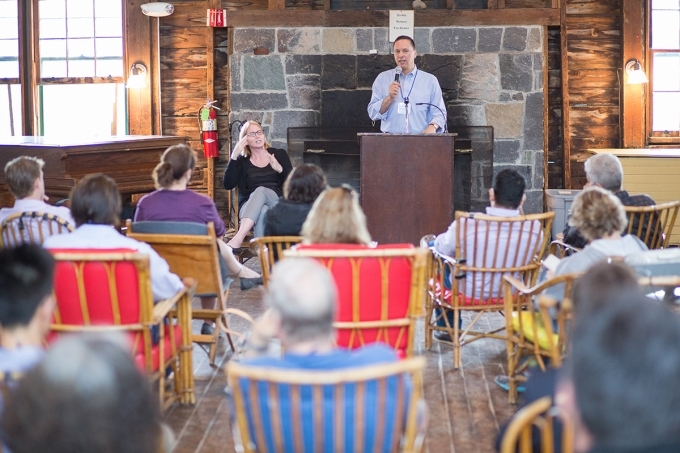Forum Focuses on Teaching Social Entrepreneurship

MIDDLEBURY, Vt. — More than 120 educators from around the U.S. gathered at Middlebury’s Bread Loaf campus last week for the College’s third annual Center for Social Entrepreneurship Forum. Built around a theme of “Teaching Social Entrepreneurship: Lessons and Opportunities,” the forum started June 9, and featured four days of talks and workshops by educators and social entrepreneurs.
Professor Jon Isham, faculty director of the Middlebury CSE, says the goal of the forum is for educators to share what they’ve learned about teaching social entrepreneurship—what works and how to make improvements. He said this year’s group is the most diverse so far. “We’ve got folks from secondary ed for the first time,” Isham said. “We’ve also got folks who are deep into this and have been doing it for a decade; others are getting a taste of it for the first time, so it’s a wider distribution than we’ve had before.”
On Tuesday morning—occasionally competing with a chorus of baby birds in the barn rafters—Anke Wessels, executive director of the Center for Transformative Action at Cornell spoke about the need for rigorous methods of assessing experiential learning and reflection. Wessels has taught social entrepreneurship for six years at Cornell and believes in the power of experiential learning, but cautions that poorly designed experiential activities do not serve students well.

“They can be used by students to reinforce stereotypes; students can draw superficial conclusions from their experiences,” she said, “and they can miss the opportunity to learn about their own learning process.”
The solution, said Wessels, is to build in deep critical reflection that maps the experiential activities to the course material and learning goals. She offered forum attendees several practical tools to help develop the assessment she described.
Thanh Nguyen, design and entrepreneurship officer at Dartmouth, was attending the forum for the first time and was eager to hear from colleagues at other institutions. He says that entrepreneurship in many different forms is very popular at Dartmouth and that the college is starting its first course in social entrepreneurship. “One other area that I’m particularly interested in is empathy; how to raise that issue with students and have them see the value of empathy,” Nguyen said.

Over four days, the forum offered a broad menu of workshops, including: The Entrepreneurship Side of Social Entrepreneurship; Equipping Social Entrepreneurs with the Tools they Need; Social Entrepreneurship and Secondary Education; Perspectives on the Social Entrepreneurship Landscape; Using Skills from the Corporate World to Scale a Social Enterprise; and an 8-hour training in the “Work On Purpose” curriculum.
Elizabeth Robinson ‘84, co-director of the Middlebury Center for Social Entrepreneurship and director of the College’s Programs on Creativity and Innovation in the Liberal Arts, said she hopes participants will return to their schools with a sense of the many approaches to teaching social entrepreneurship already underway. “We need a conference like this because, even though everyone has heard about social entrepreneurship now, we still really need to get a handle on what it is, how to teach it, and how to define it,” said Robinson. “We’re creating it as we speak and who better to learn from than our peer schools?”
The Middlebury Center for Social Entrepreneurship was established in 2012 with support from Alan Hassenfeld and the Hassenfeld Family Foundation. Reflecting the tradition of the liberal arts, the center is a resource for students to learn to be effective agents of social change. Its annual programming includes a symposium in January, the CSE Forum in June, summer grants, fellowships, academic courses, research, and skills workshops. The center is designed to be a hub within a global network of schools, NGOs, government agencies, businesses, and foundations that share a commitment to creating 21st-century solutions.
By Stephen Diehl; Photos by Matt Lennon ’13

